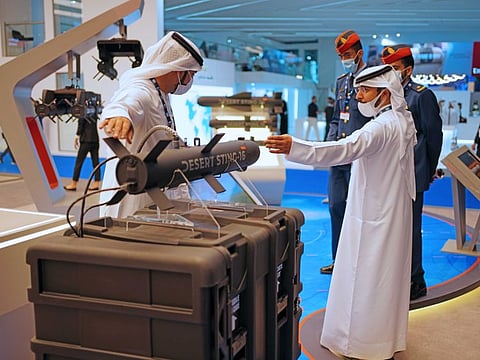Dubai Airshow Day 1: Aviation recovery gathers pace as billion-dollar deals struck
Indigo Partners announces order for 255 Airbus A321 aircraft at $33b list price

Dubai: The aviation industry seems to have brushed aside the impact of the COVID-19 pandemic, with multi-billion dollar deals being announced on Day 1 of the Dubai Airshow 2021.
This year’s biggest-ever aerospace event commenced at the Al Maktoum International Airport, Dubai World Central, on Sunday. The airshow will run until Thursday, November 18, and will have more than 1,200 exhibitors from 148 countries displaying over 160 aircraft.
On the first day of the mega event, industry executives spoke about the future of aviation and the importance of gender equality in the $400 billion sector. Even though the pandemic slowed down deal-making in the airline space, Wizz Air-owner Indigo Partners announced a massive order for 255 Airbus A321 aircraft at a list price of $33 billion.
Deals were not limited to airlines alone. GAL, a subsidiary of UAE defence technology entity EDGE, was awarded a Dh11 billion performance-based logistics (PBL) contract to supply the UAE Air Force and Air Defence (AFAD) with maintenance, repair and overhaul (MRO), and specialised support services.
Meanwhile, Israel participated in the Dubai Airshow for the first time, a year after the Abraham Accords were signed between the UAE and Israel.
A top official from Israel Aerospace Industries (IAI) said the company was looking to sign freight conversion deals with other UAE-based airlines, months after forging a partnership with Abu Dhabi’s Etihad airways.
New demand
European plane-maker Airbus predicted that the aviation industry would require around 39,000 aircraft in the next 20 years. The demand for new aircraft will include around 29,700 small aircraft like the A220 and A320 aircraft, as well as about 5,300 in the medium aircraft category such as the A321XLR and the A330neo.
“We’re now towards the end of 2021 and we project the corridor of recovery in global worldwide traffic, that sees us back to pre-COVID levels, sometime between 2023 and 2025,” said Christian Scherer, Chief Commercial Officer and Head of Airbus International, during a media briefing ahead of the Dubai Airshow.
In the meantime, competition in the freight market is heating up with Boeing in discussions to sell a cargo version of its future 777X jet. European rival Airbus is also expecting to strike an A350 freighter deal soon.
Dubai’s recovery
The airshow comes as Dubai’s aviation sector bounces back from the pandemic, which led to the grounding of passenger jets and wiped out air travel demand across the world. Over the last year, Emirates and flydubai have slowly restored their networks as major markets opened for travel.
The Dubai Airshow is a testament to the emirate’s response to the pandemic, said Sheikh Ahmed bin Saeed Al Maktoum, President of the Dubai Civil Aviation Authority, and Chairman and CEO of Emirates airline and group, during a media briefing earlier this month.
Dubai’s COVID-19 response was focused on “protecting the health and wellbeing of the people as a top priority, while minimising the impact of the crisis on the nation’s economy,” he had said.
Aircraft display
One of the biggest highlights of the show was the static park and flying display, which featured more than 175 of the world’s most advanced aircraft on ground and in the air. The airshow also featured aerobatic displays from the UAE Air Force’s Al Fursan, the Russian Knights, the Saudi Hawks, Surya Kiran from India and the Sarang Team of the Indian Air Force.
Checkmate, the next generation Sukhoi fighter jet, made its first international debut for the next generation Sukhoi fighter jet. The Boeing 777X and the Leonardo AW609 also made debuts at this year’s airshow.
Sign up for the Daily Briefing
Get the latest news and updates straight to your inbox








